Most shoulder and upper arm pain conditions can get better with home care measures. However, certain conditions need medical help.

There are many conditions which lead to upper arm and shoulder pain. Usually the pain occurs due to overuse, strains, or sprains. Such conditions can be treated with self care measures. However, there are many conditions which need medical help, and shouldn't be ignored as they can get worse. Read on, to learn about the possible causes behind it.
Possible Causes
Mentioned below are the main causes that might trigger off shoulder and arm pain. There are a variety of reasons as can be seen from the following points.
- Bursitis is the condition, where inflammation of a fluid filled sac, which lies between the tendon and skin or between tendon and bone occurs.
- Sports injury occurs when a person is stretching his head away from the shoulder, this results in an electric shock-like sensation which can cause this condition.
- Due to overuse or a certain injury, inflammation of nearby tendons can occur. Tendons which connect bicep muscles to the upper arm can cause mild to severe pain.
- Carpal tunnel syndrome starts primarily with pain which occurs in the wrist, and finally causes pain and weakness in the shoulder and arm.
- Thoracic outlet syndrome is caused because of physical trauma. Due to this condition a person can suffer from upper right arm pain and shoulder pain. Numbness of these body areas can also occur.
- Frozen shoulder syndrome is another cause for shoulder ache, where the muscles, tendons, and ligaments inside the shoulder become stiff. This makes it painful for the shoulder and arm to move.
- A dislocated shoulder can cause severe right or left upper arm and shoulder pain. This happens when the ball-shaped head of the arm comes out of its socket.
- Due to strains and sprains a person can get mild to severe pain.
- Rotator cuff is a type of tendinitis which occurs when there is inflammation of the tendons present in the shoulder. It can cause pain and the arm pain becomes worse at night. This condition can also cause weakness.
- Pain (in shoulder, neck, or arms), pressure in chest, shortness of breath, sweating, or nausea with or without chest discomfort are signs of a heart attack.
Treatment
The treatment differs according to the condition. But, common conditions like sprains and strains or overuse of shoulder and upper arm can be treated at home with self-care measures. However, many conditions need immediate medical help. If you are suffering from common shoulder and arm pain conditions like sprains or strains, then use these measures to get rid of the pain.
Home Care Measures
- Try to protect your shoulder and arm as much as possible, if possible let it completely rest for a few days.
- Take a break from your school or work till the pain recedes.
- Apply an ice compress to the sore arm for 15 to 20 minutes three times a day.
- Keep the arm elevated to reduce the swelling.
- To get relief from the pain you can consider taking an over-the-counter painkiller.
When to Seek Medical Care
- Seek emergency help, if you are displaying heart attack symptoms.
- Emergency medical help is also required if you have a protruding bone or an obvious deformity in the shoulder or arm.
- See your doctor right away, if you have severe pain and swelling in the arm or shoulder, or if you have trouble moving the arm in the normal way. Seek immediate medical help if you have arm, shoulder, or back pain which comes without any exertion and is relieved by rest, or if you hear a sudden snap or cracking sound during an injury of the arm or shoulder.
- Make an appointment if you still have arm pain that doesn't go away within a week's use of the above self-care measures, or if your symptoms become worse.
These were the causes of shoulder and arm pain, and how to cure common sprains and strains with home treatment. However, to treat other conditions seek medical help.
Disclaimer: This Buzzle article is for informative purposes only, and should not be used as a replacement for expert medical advice.


 There are many conditions which lead to upper arm and shoulder pain. Usually the pain occurs due to overuse, strains, or sprains. Such conditions can be treated with self care measures. However, there are many conditions which need medical help, and shouldn't be ignored as they can get worse. Read on, to learn about the possible causes behind it.
There are many conditions which lead to upper arm and shoulder pain. Usually the pain occurs due to overuse, strains, or sprains. Such conditions can be treated with self care measures. However, there are many conditions which need medical help, and shouldn't be ignored as they can get worse. Read on, to learn about the possible causes behind it.